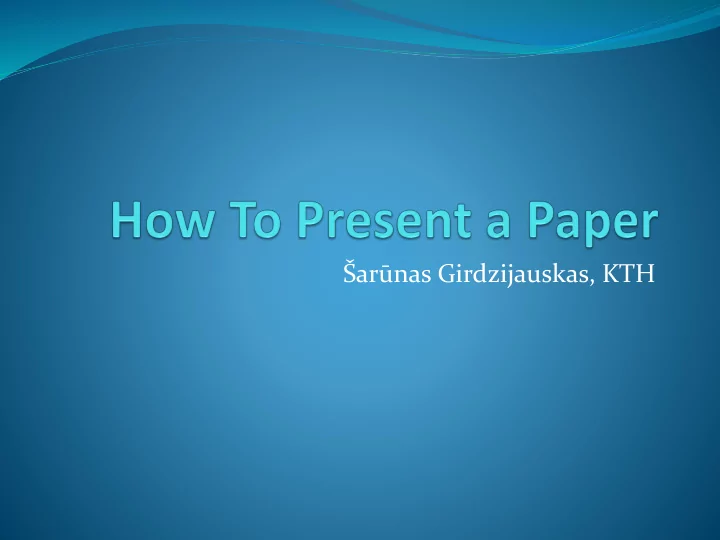

Šarūnas Girdzijauskas, KTH
Your Presentations 30 min in total (target 20-25 min for your presentation) Evaluation Slides; Quality of Presentation; Paper understanding; Question Answering.
What to Present? You do not need to retell each and every part of the paper!!! Motivation The Ideas/Main Concepts Results Unveil both positive and negative sides of the paper negative sides are usually well hidden
How to Present? Know Your Audience!!! While referring to a concept check if… …it is a “ common knowledge ” or needs a special introduction maybe not included in the paper itself! …it has been introduced in the presentation before
Never proceed if you think some concept might not be clear for your audience!
How to Present? (cont.) If you think you won’t fit into 20 -25 min with all your concepts… …order them by importance …throw the least important away …iterate until you fit into 20-25 min ;-) 1 slide ~ 2 min, so do not have too many slides! Make few Hidden Slides for Q&A
Slides In summary the primary contributions of our work are the following: We introduce the architecture of a scalable RDF database system that leverages best-of- breed single node RDF-stores and parallelizes execution across them using the Hadoop framework. We describe date partitioning and placement techniques that can dramatically reduce the amount of network communication at query time. We provide an algorithm for automatically decomposing queries into parallelizable chunks. We experimentally evaluate our system to understand the effect of various system parameters and compare against other currently available RDF stores. Many of our techniques are applicable to general graph data management applications, especially those for which subgraph matching is an important task. Furthermore, while our system is primarily designed for the largest RDF data sets, we will also show that even for smaller data sets, the techniques introduced in this paper are highly relevant.
Slides (alternative) Contributions: Scalable RDF database on Hadoop Data Partitioning & Query Decomposition General Applicability; Small & Big Data Sets
Slides (alternative) Contributions: Scalable RDF database on Hadoop Data Partitioning & Query Decomposition General Applicability; Small & Big Data Sets
Another (Bad) Example
Pseudocodes
Slides (cont) Animations as an alternative to text, pseudocodes and formulas Publisher node for topic Topic Tgreen Tgreen Topic Access Point T1 P3 P4 T2 P12 T3 P5 Topic Access Point Topic Access Point Tgreen P4 T2 P4 T1 P3 T3 P11 T3 P22 T4 P3
Figures Always introduce X and Y axes as well as general settings before explaining!
Paper Review Purpose: Help the Conference Chair to select the best papers Structure of the review: Give a brief summary of the paper i.e., what authors “ actually do ” (not always the same what they “ claim to do ”) Motivation: Why is it interesting and imporant? Contributions: What is solved? How is it solved? ~3 strong and ~3 weak points Your own Opinion and Recommendation
Recommend
More recommend